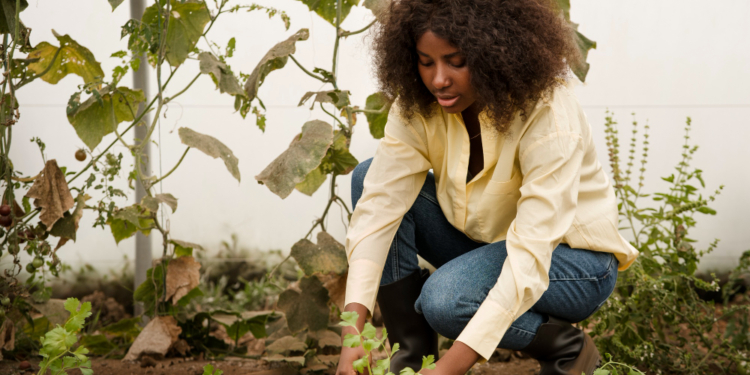Gardens are more than just eye candy or a platform for honing your DIY prowess. They wield the power to enhance your health, offering a gateway to environments and activities that elevate the functioning of both your mind and body. Across the globe, studies have intricately connected gardening to an improved quality of life, spanning urban and rural landscapes and benefiting individuals from children to seniors.
Living a healthy life is a universal pursuit. The quest involves engaging in activities that foster physical and mental well-being. Whether you’re a seasoned health enthusiast or just starting your journey, the road to vitality includes diverse pursuits like healthy eating habits, daily exercise, meditation, prayer, journaling, or acting kindly. These endeavours, while demanding effort and resilience, ultimately contribute to a profound sense of well-being.
Why Gardening is Good for You
1. Gardening Relieves Stress
Research from the Netherlands delves into cortisol, a natural stress-response steroid. Surprisingly, gardening after a stressful event surpasses even reading in providing stress relief. Home gardeners prioritize psychological benefits, emphasizing stress relief over cultural or economic gains. Interestingly, soil bacteria, acting as natural antidepressants, further contribute to stress reduction.
2. Gardening Counts as Exercise
The Center for Disease Control and Prevention categorizes gardening as moderate physical activity. Tasks like lifting planters, digging, stretching, and mowing engage every muscle, burning over 300 calories per hour—equivalent to walking a golf course with clubs. Beyond the physical benefits, gardening enhances dexterity, hand strength, and may combat age-related weight gain, promising a sounder sleep after a day’s work.
3. Gardening Hinders Dementia
Gardening transcends physical exercise; it’s a brain-boosting activity. Studies indicate a 36% lower risk of dementia for avid gardeners. Cognitive function receives a significant uplift, adding extra protection against cognitive decline.
4. Gardening: A Natural Shield Against Chronic Conditions
Sunlight isn’t just for plants; your body craves it, too. Gardening offers a dual benefit of healthy exercise and sun exposure, facilitating the production of vitamin D. This crucial vitamin influences various genes and tissues, impacting metabolism, the immune system, heart health, bone density, and mental well-being. Gardening becomes a multifaceted approach to combatting conditions like type 2 diabetes and heart disease.
5. Gardening: The Social Glue
Beyond solitary toil, gardening fosters connections. It serves as a bridge to broader communities, countering the detrimental effects of loneliness. Whether through local gardening centres, online communities, or shared spaces like community gardens, gardening creates social bonds and support networks. Particularly impactful in urban settings, gardening provides a platform for enhanced interracial interactions.
6. Gardening: Cultivating Positivity and Esteem
Nature, inherently therapeutic, contributes to emotional well-being. Gardening emerges as a mood enhancer linked to increased positivity, optimism, and a fight against depression. The benefits extend to self-esteem, with adults and children experiencing behavioural improvements. Studies consistently rank gardening among the top activities for happiness and meaningfulness, with the most pronounced effects observed in women and lower-income individuals.
7. Gardening: Nurturing Healthier Diets
Making healthy food choices becomes more accessible through gardening. Growers of fruits, vegetables, and herbs enjoy easy access to nutritious options, with the advantage of controlling pesticides and fertilizers. Studies indicate that homegrown produce, especially vegetables, increases consumption. Children, in particular, are more likely to eat fruits and vegetables when gardening, promoting both nutritional awareness and positive emotional impacts.
Conclusion
In conclusion, gardening goes beyond creating beautiful landscapes; it contributes to a healthier, happier life. From stress relief to fostering connections, the benefits are undeniable. So, if you’re looking for a scientifically backed reason to embrace gardening, you now have seven!
FAQs
- Is gardening suitable for everyone?
- Gardening is a versatile activity suitable for people of all ages and physical abilities. You can adapt the scale and intensity of gardening based on your preferences and capabilities.
- Can indoor gardening provide the same benefits?
- While outdoor gardening offers additional benefits like sunlight exposure, indoor gardening with potted plants can still relieve stress and improve indoor air quality.
- How much time should I spend gardening to see positive effects?
- Even spending a few hours a week in your garden can yield positive effects. It’s more about the regularity and enjoyment than the duration.
- What if I don’t have a green thumb?
- Gardening is a learning process, and everyone starts somewhere. Start with easy-to-care-for plants and gradually expand your garden as you gain confidence and experience.
- Can gardening replace traditional forms of exercise?
- While gardening provides a good workout, it’s advisable to incorporate various physical activities for overall health. Gardening can complement your exercise routine rather than replace it.


Discussion about this post